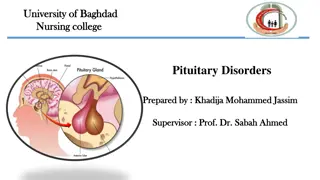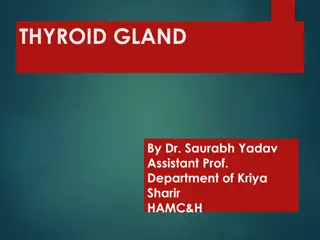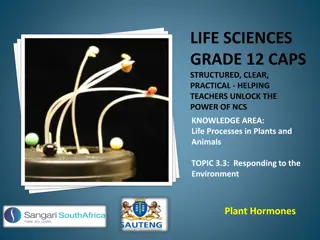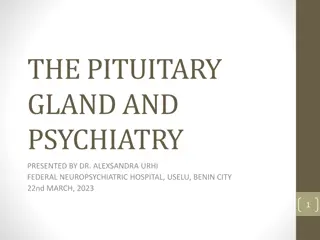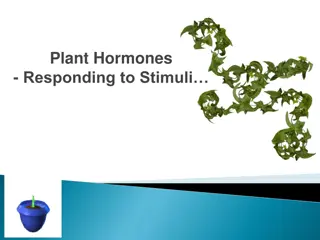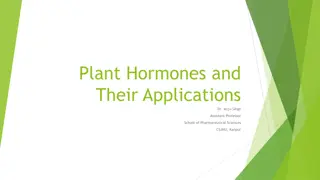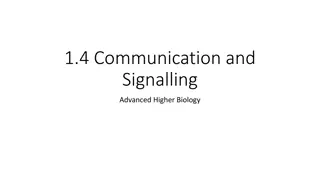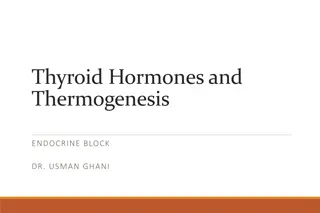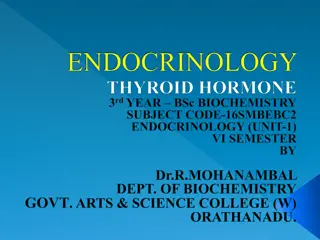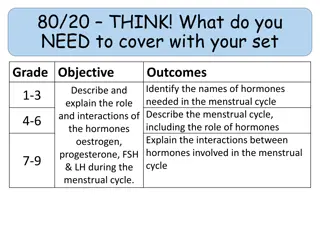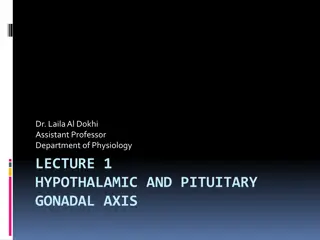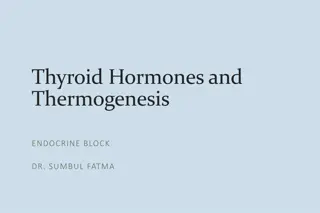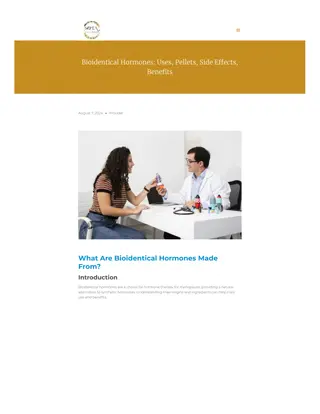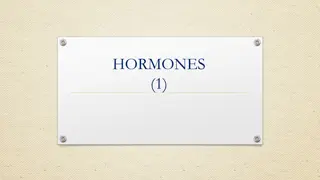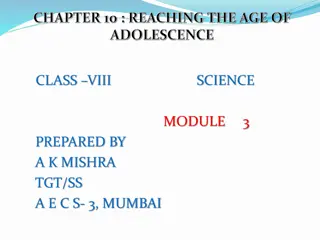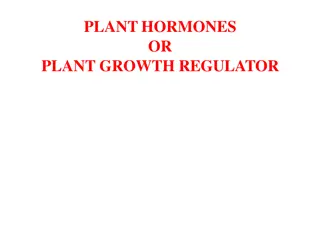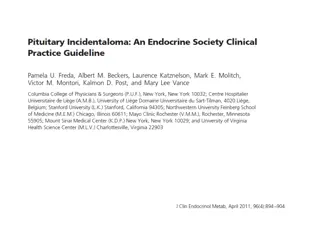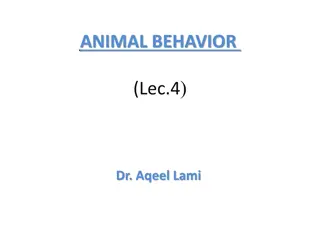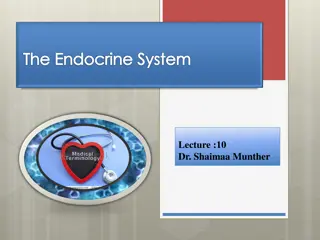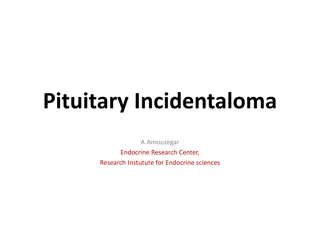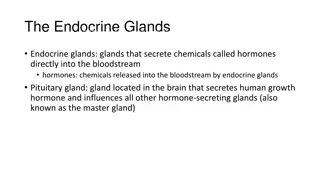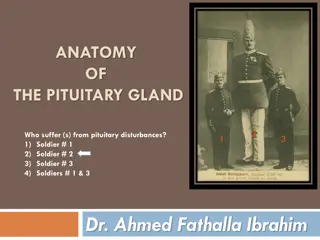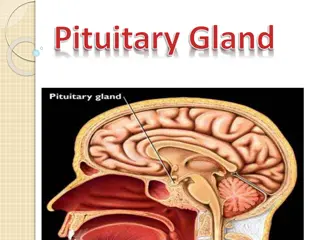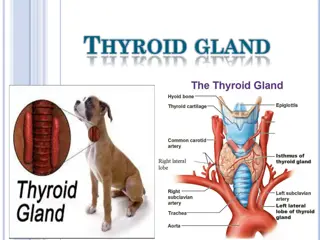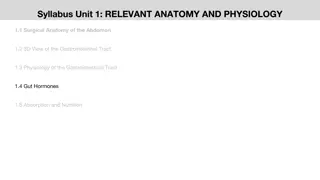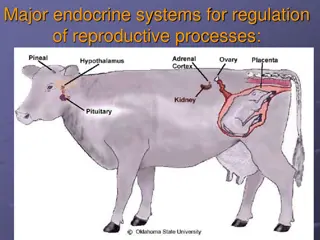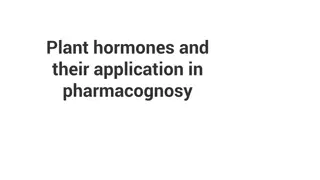Pituitary Disorders
Pituitary disorders, often caused by tumors, can disrupt hormone production leading to various symptoms like weight gain, vision problems, and hormonal imbalances. The pituitary gland plays a crucial role in regulating bodily functions through hormone secretion. Factors such as tumor growth, head in
0 views • 25 slides
Understanding Pituitary Gland Functions in Endocrinology Course
Explore the intricate workings of the pituitary gland in endocrinology, delving into hypo- and hyperfunction aspects, hormonal regulation, and physiological characteristics. Learn about the crucial role of hormones, their actions on target organs, and the specificity of their interactions with cellu
6 views • 71 slides
Understanding Reproductive Hormones in Males and Females
Reproductive hormones play crucial roles in the body, acting as chemical signals released by endocrine cells. In males, hormones like testosterone, gonadotropin, and estrogen regulate various functions related to reproduction. Similarly, in females, hormones like GnRH, FSH, and LH are essential for
6 views • 16 slides
Understanding Hypothalamus and Pituitary Hormones in Clinical Pharmacology
Peptides and glycoproteins are secreted by the hypothalamus and pituitary, regulating anterior pituitary hormones. Hormones like adrenocorticotropic hormone (ACTH) and corticotropin-releasing hormone (CRH) play crucial roles. Synthetic adrenocorticosteroids have limited the use of corticotropin for
1 views • 28 slides
Understanding Bioidentical Hormone Replacement Therapy
Bioidentical Hormone Replacement Therapy (BHRT) involves using compounded hormones that are chemically identical to the hormones in the human body. Customized compounded bioidentical hormones offer flexible dosing based on individual needs, with growing clinical validation for hormone optimization.
1 views • 12 slides
Understanding the Thyroid Gland: Functions and Hormone Synthesis
The thyroid gland is a vital endocrine gland located below the larynx, responsible for producing thyroid hormones essential for regulating metabolism. This gland consists of follicles lined with follicular cells, producing thyroglobulin and thyroid hormones T3 and T4. Iodine plays a crucial role in
0 views • 40 slides
Understanding Plant Hormones and Their Functions in Plants
Plant hormones play crucial roles in various plant processes such as growth, development, and response to environmental stimuli. Auxins, gibberellins, and abscisic acid are key plant hormones that regulate tropisms, cell division, elongation, flowering, seed germination, and dormancy. Understanding
1 views • 50 slides
Understanding the Pituitary Gland: Implications in Psychiatry
This presentation by Dr. Alexsandra Urhi delves into the anatomy, function, and psychiatric implications of the pituitary gland. It explores the interplay between endocrine structures, the CNS, and psychotropic drugs' effects on the pituitary gland.
0 views • 35 slides
Understanding Plant Hormones and Their Role in Growth and Development
Plant hormones are essential chemicals that enable plants to respond to environmental stimuli, regulate growth processes like cell division and elongation, and control key developmental stages such as flowering and fruit development. Key hormones include auxin, gibberellins, and abscisic acid, each
0 views • 34 slides
Understanding Plant Hormones and Their Roles in Growth and Development
Plant hormones, also known as phytohormones, play crucial roles in regulating various cellular processes within plants. They affect gene expression, cellular division, and growth, among other functions. The five major classes of plant hormones include auxins, cytokinins, ethylene, gibberellins, and
0 views • 8 slides
Cell Communication and Signalling in Biology
Cells communicate through extracellular signalling molecules that bind to specific receptors on target cells, leading to changes in cellular behavior. Hormones such as steroid and peptide hormones, neurotransmitters like nor-adrenaline and acetylcholine, play crucial roles in cell signaling. Recepto
0 views • 25 slides
Understanding Thyroid Hormones: Biosynthesis, Functions, and Clinical Implications
This educational material delves into the types and biosynthesis of thyroid hormones, the physiological actions of thyroid hormones, regulation levels, thyroid function tests, goiter, and the distinction between hypo- and hyperthyroidism. It covers the role of thyroid hormones in thermogenesis, meta
0 views • 33 slides
Overview of Pituitary Gland: Structure, Function, and Relationships
The pituitary gland, also known as the hypophysis, is an endocrine gland located at the base of the brain. It is divided into two main parts: the adenohypophysis and the neurohypophysis. The gland plays a crucial role in hormone regulation and is closely related to neighboring structures such as the
0 views • 26 slides
Endocrinological Aspects of Pregnancy: Hormones, Functions, and Synthesis
During pregnancy, endocrinological structures like the corpus luteum and placenta play vital roles in the production of hormones such as progesterone and estrogens. Progesterone maintains pregnancy by controlling essential functions like endometrial differentiation, myometrial quiescence, and local
4 views • 15 slides
Understanding Thyroid Hormones and Their Role in Metabolism
Thyroid hormones, including triiodothyronine (T3) and thyroxine (T4), are essential for regulating metabolism, growth, development, body temperature, and heart rate. They are tyrosine-based hormones produced by the thyroid gland, requiring iodine for synthesis. T3 affects various physiological proce
2 views • 17 slides
Understanding the Hormones in the Menstrual Cycle
Explore the intricate role of hormones in the menstrual cycle, including the names and functions of key hormones like oestrogen, progesterone, FSH, and LH. Learn how these hormones interact and change throughout the cycle, influencing ovulation and menstruation. Dive into activities and resources to
6 views • 19 slides
Understanding the Hypothalamic-Pituitary-Gonadal Axis in Reproductive Physiology
Explore the intricate relationship between the hypothalamus, pituitary gland, and gonads in regulating reproductive functions. Learn about hormone definitions, hypothalamic-pituitary interactions, gonadotropic hormones, and feedback mechanisms crucial for reproductive control.
0 views • 13 slides
Understanding Thyroid Hormones and Thermogenesis in Endocrinology
This lecture covers the types, biosynthesis, actions, regulation, and clinical implications of thyroid hormones. It explains the functions of thyroxine (T4) and tri-iodothyronine (T3), their synthesis in the thyroid gland, and their transport in the body. The role of thyroid hormones in thermogenesi
2 views • 30 slides
Understanding the Microscopic Structure and Function of the Pituitary Gland
Explore the detailed histology of the pituitary gland, focusing on its adenohypophysis and neurohypophysis components. Learn about the diverse parenchymal cells, including acidophils, basophils, and chromophobes, and their respective functions in hormone production. Dive into the significance of the
0 views • 6 slides
Bioidentical Hormones - Benefits, Pellets and Side Effects
Benefits, risks, and uses of bioidentical hormones, including pellets, for menopause relief. ingredients and differences. Bioidentical hormones are a choice for hormone therapy for menopause, providing a natural alternative to synthetic hormones. Und
1 views • 5 slides
Understanding Hormones and their Role in the Body
Hormones are chemical messengers that play a crucial role in regulating various metabolic functions in the body. They are transported through the bloodstream to tissues and organs, affecting processes like growth, metabolism, and reproduction. Some hormones have autocrine and paracrine effects in ad
0 views • 25 slides
Understanding Hormones and Reproductive Changes in Adolescence
Changes during adolescence are driven by hormones like testosterone in boys and estrogen in girls, leading to physical developments such as facial hair growth and breast development. Hormones play a crucial role in initiating reproductive functions, with endocrine glands releasing hormones to target
0 views • 19 slides
Understanding Plant Hormones and Growth Regulators
Plant growth regulators, also known as plant hormones, play a crucial role in regulating growth and development in plants. They are organic compounds that act at low concentrations to promote, inhibit, or modify growth processes. The main plant hormones include auxins, cytokinins, gibberellins, absc
1 views • 40 slides
Pituitary Incidentaloma: Evaluation and Management Recommendations
A pituitary incidentaloma is an unsuspected pituitary lesion discovered incidentally during imaging studies not done for lesion-related symptoms. Patients should undergo a thorough evaluation for hormone hypersecretion and hypopituitarism, including clinical and laboratory assessments. Recommendatio
0 views • 69 slides
Understanding Hormones in Implants and Their Relationship to Cancer Risk
Hormones found in implants and naturally in animals and plants can impact estrogen levels, but the connection to cancer risk is complex. This article explores the presence of hormones in food, the concept of nanograms, human estrogen production, and the implications of using implants in beef product
0 views • 33 slides
Plant Growth Hormones and Defense Mechanisms: Understanding Plant Responses to the Environment
Plant growth hormones and defense mechanisms play crucial roles in how plants respond to environmental stimuli such as water, sunlight, gravity, and more. From auxins promoting cell growth to gibberellins stimulating flowering, this presentation educates on the intricacies of plant hormones and thei
1 views • 13 slides
Understanding Plant Hormones and Their Role in Growth and Development
Plant hormones are vital compounds that regulate various processes in plant growth and development. They are mostly organic and can be gases. These hormones are produced in one part of the plant and transported to other parts where they induce physiological effects. The main phytohormones include Au
0 views • 125 slides
Insights into Animal Behavior and Hormones
Explore the fascinating world of animal behavior, from the deception of recognition mechanisms in gulls to Karl von Frisch's experiments on fish sensory abilities. Learn how behavioral assays shed light on animal sensory powers and how hormones play a crucial role in regulating animal behavior. Disc
0 views • 6 slides
Understanding the Endocrine System: Key Concepts and Functions
The endocrine system, consisting of glands that release hormones into the bloodstream, plays a crucial role in regulating various body processes like metabolism, growth, reproduction, and stress response. Key glands include the pituitary, thyroid, pancreas, adrenal, ovaries, and testes, each produci
0 views • 34 slides
Understanding Pituitary Incidentalomas: Causes, Diagnosis, and Management
Pituitary incidentalomas are unexpected lesions found during imaging studies for unrelated reasons. Evaluation and management recommendations rely heavily on clinical experience due to limited literature on the topic. Etiology includes mostly pituitary adenomas and a small percentage of nonpituitary
0 views • 37 slides
Understanding How Hormones Interact: The Endocrine System
The endocrine system comprises glands that release hormones into the bloodstream, influencing various bodily functions. Key glands include the pituitary, pineal, thyroid, pancreas, gonads, and adrenal glands, each playing a crucial role in regulating metabolism, growth, stress response, and reproduc
0 views • 5 slides
Understanding the Endocrine System: Hormones, Glands, and Regulation
The endocrine system, comprising glands such as the pituitary, thyroid, pancreas, and more, produces hormones that regulate various bodily functions. These hormones target specific cells with receptors, influencing metabolism, growth, energy usage, and more. By understanding how hormones interact wi
0 views • 12 slides
Understanding the Pituitary Gland: Anatomy, Functions, and Disorders
The pituitary gland, also known as the master endocrine gland, plays a crucial role in regulating various hormonal functions in the body. Learn about its anatomy, position, subdivisions, important relations, and common disturbances. Explore how soldiers and individuals like them can be affected by p
0 views • 17 slides
Understanding the Posterior Pituitary Gland and Its Hormones
The posterior pituitary gland, a key part of the endocrine system, plays a vital role in hormone secretion. It controls the release of oxytocin and vasopressin, influencing social bonding, reproduction, and childbirth. Learn about the anatomy, function, and disorders associated with this important g
0 views • 26 slides
Understanding the Pituitary Gland: Structure, Function, and Hormones
The pituitary gland, located at the base of the brain, comprises two main portions - the anterior lobe (adenohypophysis) and the neurohypophysis. The anterior lobe consists of various cell types that secrete hormones like GH, prolactin, TSH, ACTH, FSH, and LH. GH, also known as STH, plays a crucial
0 views • 17 slides
Understanding the Thyroid Gland: Structure, Hormones, and Function
The thyroid gland, a butterfly-shaped structure located on the ventral surface of the trachea, secretes hormones essential for regulating metabolic rate, growth, and development. It produces hormones like Tetraiodothyronine T4, Triiodothyronine T3, and Calcitonin, which play crucial roles in maintai
0 views • 21 slides
Understanding the Role of Gut Hormones in Regulating Feeding Behavior
The syllabus covers relevant anatomy and physiology related to the gastrointestinal tract, emphasizing the regulation of feeding processes. It discusses the role of gut hormones such as ghrelin, obestatin, cholecystokinin, pancreatic polypeptide (PP), and peptide YY (PYY) in controlling appetite, en
0 views • 7 slides
Endocrine Systems in Reproductive Regulation
The endocrine system plays a crucial role in regulating reproductive processes by secreting hormones that influence cellular activity. This system involves ductless glands like the hypothalamus, pituitary gland, and other endocrine glands working together in a feedback mechanism. Hormones of various
0 views • 19 slides
Understanding Plant Hormones and Their Role in Pharmacognosy
Plant hormones, also known as phytohormones, are essential chemical compounds in plants that regulate various developmental processes. They include auxins, gibberellins, cytokinins, ethylene, and abscisic acid, each with specific functions in growth, reproduction, and response to environmental stimu
0 views • 21 slides
Overview of Endocrinology: Coordination of Body Functions by Chemical Messengers
The body's functions are coordinated by various chemical messenger systems, including neurotransmitters, endocrine hormones, neuroendocrine hormones, paracrines, autocrines, and cytokines. Endocrine hormones travel through the circulatory system, binding to receptors in cells to regulate metabolism,
0 views • 18 slides
